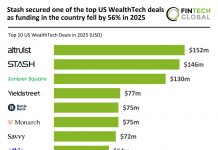The future of digital investing during the coronavirus is a battle of two-sides. On one side you have the increased usage of online services and a greater number do-it-yourself (DIY) investors, and the other has a coyness from managed proposition users and more uncertainty from decision makers.
What is the situation? The Covid-19 pandemic has played havoc with the world’s economics. People are being forced to stay indoors, which has left lots of companies without business and masses of peoples losing their jobs. Research from the Organisation for Economic Co-operation and Development (OECD), an economic organisation of 37 member countries, claimed in April that the number of unemployed people in member countries rose by 18.4 million to reach 55 million. The US’ Organisation for Economic Co-operation and Development even claimed that 15% of its population could be jobless by Q3 2020 – it was less than 4% in Q1 2020.
The full extent of unemployment is still hard to judge. But one thing that is looking ever so likely is that the world is heading to a world recession, one that it has not seen since the end of the Second World War. The World Bank recently stated that the global economy could shrink by 5.2% this year, which would not only be the deepest recession since WW2, but hitting more countries since 1870. Times are indeed bleak and naturally people are going to be cautious about the future.
With a large part of the world on track for a recession it raises question marks around the future of digital investing. With the economy in such a bad state, will retail investors really be gambling on the world of investing? Well, according to Nikolai Hack, head of strategy and partnerships at cloud-native savings and investment platform Nucoro believes it’s yes and no.
He said, “It largely depends on the type of proposition that clients are using. As recessions often go hand in hand with increased market volatility, DIY investors tend to deposit more funds to try and make use of what they think are good opportunities. With managed propositions, their clients tend to be of a less adventurous mindset and are much more likely to withdraw funds from their portfolios and managers.” What makes things even hard to predict is that people’s situation changes so rapidly. If the person loses their job, for example, they may need more cash to hand and therefore decide to divest.
While there could be some people choosing to hang up their investing boots, it is not necessarily the beginning of troubled times for investing services. In fact, digital retail investment platform Robinhood has recently become a decacorn, one of the few FinTechs to reach such an exclusive achievement. The term means the company has exceeded a $10bn valuation, with it being worth around $11.2bn after a $200m Series G. The platform has been growing quite rapidly during the lockdown, with it closing its Series F on $600m in July at a $8.3bn. The company claimed consumers have been engaging more with these during the lockdown. It claims that average unique daily visits on its learning tools are up by more than 250% since January.
Robinhood may be doing well, but it does not mean every digital investing service will thrive. The coronavirus could end up being both beneficial and detrimental to the development of digital investing. Hack said, “It’s interesting as there are two opposing forces at play here. On the one hand you have the ultimate push towards digital channels in the form of non-existent offline life (which should be great for digital propositions). On the other hand you have a lot of economic uncertainty that will make decision makers think twice before investing in a digitalisation or transformation project. It’s probably too early to say what will be the final outcome, but it will again be a two-sided development: Challenger propositions built as digital-first offerings will likely thrive, digital investing as a topic of corporate transformation will likely be stalled quite a bit until the dust settles.” If there is going to be a fallout in the market, it could be the time to reassess approaches to consumers.
A survey from PayActiv claimed that 82% of workers are more concerned about financial challenges than their health. With the world heading towards a recession, it begs the question of how people will react. Will people look towards digital investing as a way to increase their financial stability or will they avoid these platforms altogether? Hack believes that unfortunately those worrying about their financial situation are probably not the ones that will engage with personal financial management solutions.
He said, “If anything, a proposition that is actively about “investing will most definitely drive them away as it represents an overwhelming if not uncomfortable topic.” If a company does want to reach this untapped market, Hack believes it is much more beneficial to offer an outcome oriented solution or a product that is not directly an investment offering at all. Instead, they should provide a service that focuses on helping them to achieve their life goals by a number of money related actions, regardless of whether the underlying activity that gets them there is saving more, investing with higher returns or budgeting better. “Only if investing feels merely like one of many ways to achieve an end will people who don’t actively engage with the topic of investing actually become investors.”
It does not stop there. Hack believes that companies should be moving away from looking at things from a technical point of view. If firms want to ease the worries of consumers regarding their financial future, they have to rethink their products, methodologies and portfolio management approaches to be client-centric. “What clients want are houses, experiences or a secure retirement – and what many providers offer them are SIPPS, ISAs and a myriad of other acronyms that mean nothing to the average person. Consumers care about the house and not about the products that get them there – and, again, a bank or investment platform is simply a means to an end.” The key is to thinking about outcomes first and building propositions around meeting these goals.
Copyright © 2020 FinTech Global











